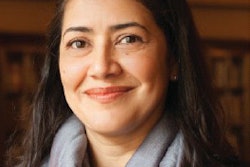It’s not oft en that a child decides in elementary school that he wants to grow up to be a historian. But Dr. William J. Bauer Jr., associate professor of history at the University of Nevada, Las Vegas, drew his earliest inspiration from fi eld trips to California state parks.
Growing up on the Round Valley Indian Reservation in Northern California, Bauer says he noticed certain omissions. “Very oft en native people were ignored in these parks,” Bauer recalls. “Th ey rarely made reference to the native people who were indigenous to these areas. So I wanted to devote my time and energy to looking at the role that native people, and native workers, had in helping to create what we know about the American West."
Bauer says his work diff ers from other research that has been done on the Round Valley community and other reservations. “Much of [the research] that [has] been done tends to look at what non-native people did to native people; what my work emphasizes is what Native Americans themselves have done and are doing.” He relies heavily on oral history records and on his own oral interviews.
Bauer says he was infl uenced by scholars who have done research on African- American slavery, particularly “those scholars who used the WPA slave narrative that allowed African-American voices to come in and interpret their own situations.”
Bauer uses his teaching and writing as part of his ardent battle against “preconceived notions about what Native American history is about and who native peoples are.
“Sometimes I get a bit frustrated,” he says, “because students will talk about Native American culture as if it is one culture, when in fact there are more than 500 sovereign Indian nations in the United States.”
Bauer, who is Wailacki and Concow and teaches American West and Native American history, requires his students to attend an annual fall powwow that is held in Las Vegas so they can experience a native community gathering.
“I work hard to combat the popular stereotypes about native people,” Bauer says.
His current project is evidence of that eff ort. Th rough “Indigenizing California History,” a book in progress, Bauer wants “to insert California Indians into the intellectual history of the United States in the early 20th century.” His past works include We Were All Like Migrant WorkersHere: Work, Community and Memory on California’s Round Valley Reservation, 1850-1941; essays on California Indian history in the Western Historical Quarterly; Native Pathways: American Indian Culture and Economic Development in the Twentieth Century; and A Companion to California History.
Dr. John Valery White, executive vice president and provost of UNLV, describes Bauer’s research as transformational.
“He is transforming the fi eld of American Indian history,” says White. “Dr. Bauer is creating a legacy that encompasses the culture of California’s Round Valley Reservation and, furthermore, common American Indian traditions throughout the United States.
“He is an emerging scholar with an opulent desire to build bridges between the extant history and today’s current state.”
Title: Associate Professor, History, University of Nevada, Las Vegas
Education: B.A., history and American studies, University of Notre Dame; M.A. and Ph.D., history, University of Oklahoma.
Age: 37
Career Mentors: Dr. Bruce Birkett, Dr. Andrew Westphal, Professor Buford Price, University of California, Berkeley; Professor Mark Thiemens, University of California, San Diego.
Words to Live By: I have to borrow a line from my graduate adviser Andrew Westphal, who once told me: “If you’re not having fun doing it, you’re doing it the wrong way.” This advice has and continues to serve me well. Along this line, I would add: Follow your passions and interests, which will allow you to have fun, and collaborate with others who complement your strengths and weaknesses and who are fun individuals to work with. Not only will you be more productive, but you will also learn a lot more and have more fun along the way.















